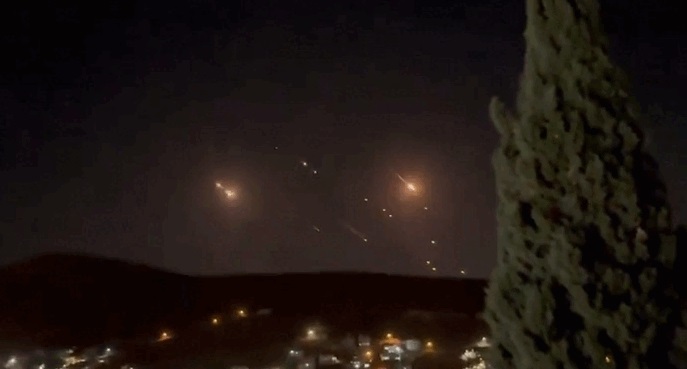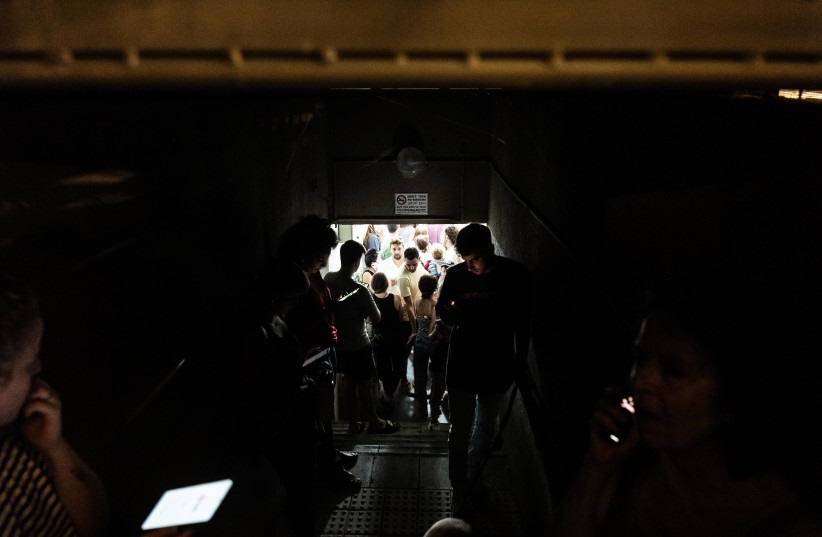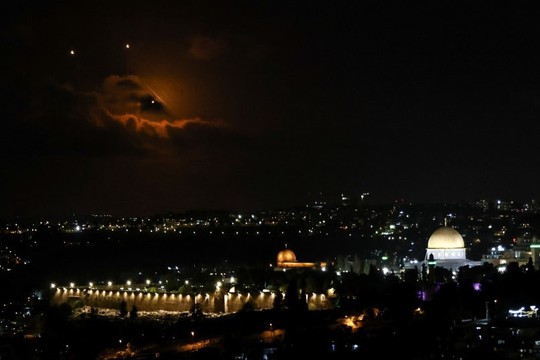The Dome of the Rock on the Al-Aqsa compound, also known to Jews as the Temple Mount is seen as projectiles fly through the sky, after Iran fired a salvo of ballistic missiles at Israel, as seen from Jerusalem October 1, 2024
Photo: REUTERS
Iran says it launched a barrage of missiles at Israel in response to the assassinations of senior Hezbollah, Hamas and Iranian officials, sending Israelis rushing to bomb shelters and raising fears of all-out war in the region, ‘Al Jazeera’ informs.
Alarms sounded across Israel and explosions could be heard in Jerusalem and Tel Aviv during the attack late on Tuesday.
Israeli military spokesman Daniel Hagari said there were no reports of casualties and that the army does not see “any more threats in our airspace”. He said in a video message that people in Israel were safe to leave shelters.
Iran’s Islamic Revolutionary Guards Corps (IRGC) said the missile attack on Israel was a response to the killing of Hezbollah chief Hassan Nasrallah and the IRGC commander Abbas Nilforoushan last week, as well as that of the Hamas leader Ismail Haniyeh earlier this year, Iran’s Fars news agency reported.
“In response to the martyrdom of Ismail Haniyeh, Hassan Nasrallah and Nilforoushan, we targeted the heart of the occupied territories,” the IRGC said in a statement.
It said its missile attack targeted “three military bases” in the Tel Aviv area.
Iran’s state television said 80 percent of the missiles launched at Israel hit their targets.
The Israel military, meanwhile, said a “large number” of missiles had been intercepted.
 Iran's missile strike on Israel.
Iran's missile strike on Israel.
Photo from video screen
Some 180 ballistic missiles were launched onto Israel on Tuesday night by Iran, ‘The Jerusalem Post’ understands, leading to 1,800 rocket sirens sounding across the country.
In a statement given to Israeli media following the attack, the IDF vowed that it would strike forcefully across the Middle East on Tuesday night.
 Israelis take shelter in Tel Aviv amid the Iranian attack, October 1, 2024.
Israelis take shelter in Tel Aviv amid the Iranian attack, October 1, 2024.
Photo: The Jerusalem Post
Ben Gurion Airport announced that all landings and takeoffs had been halted, and all trains were stopped. Planes that were in the air for landing made a U-turn. Airport activities later resumed on Tuesday evening. Jordan and Iraq have also closed their airspace.
National Security Minister Itamar Ben-Gvir said he had mobilized 13,000 emergency standby squads, which will be immediately deployed throughout Israel.
Iran last attacked Israel in April.
The second direct military showdown between Israel and Iran comes as the IDF has, in the last weeks, bombarded Hezbollah targets in Lebanon, significantly weakening the Iranian proxy group. This has included the assassination of Hezbollah leader Hassan Nasrallah. Iran had warned of repercussions for those attacks.
The US Embassy has warned its staff and their families to shelter in place before the attack, and Israel's intelligence headquarters north of Tel Aviv was evacuated in advance.
The United States said its forces were ready to provide “additional defensive support” to Israel after helping protect it from the Iranian missile attack.
“Our forces remain postured to provide additional defensive support and to protect US forces operating in the region” after “defending against Iranian-launched missiles targeting Israel”, a US defence official said on condition of anonymity.
US Secretary of State Antony Blinken said the attack was “totally unacceptable” and should be condemned by the entire world.
“Initial reports suggest that Israel, with the active support of the United States and other partners, effectively defeated this attack,” Blinken told reporters.
Iranian-backed Iraqi armed groups meanwhile said US bases in Iraq and the region will be targets if the US joins any response to Iranian strikes on Israel or if Israel uses Iraqi airspace against Tehran.
The firing of missiles came after Israeli troops launched ground raids into Lebanon, in the biggest escalation of regional warfare since fighting erupted in Gaza last October.
United Nations Secretary-General Antonio Guterres condemned the “broadening conflict in the Middle East”.
Slamming “escalation after escalation” in the region, Guterres said in a statement: “This must stop. We absolutely need a ceasefire.”
read more in our Telegram-channel https://t.me/The_International_Affairs

 9:53 02.10.2024 •
9:53 02.10.2024 •























